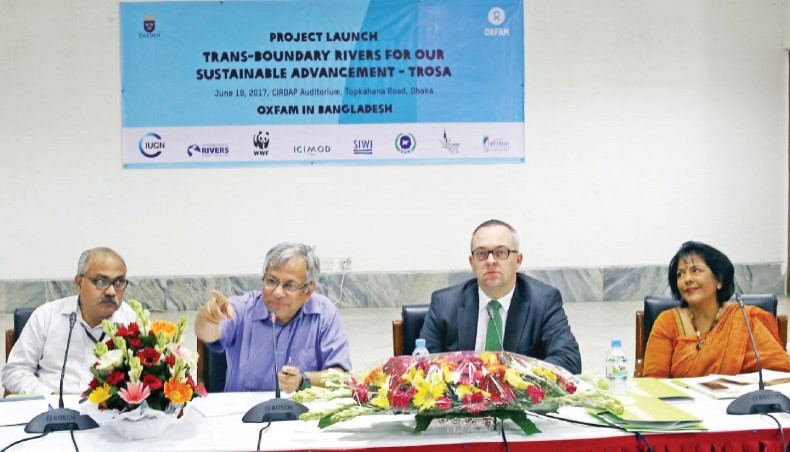Upper riparian countries need to respect lower riparian’s rights
Upper riparian countries need to respect the rights of the lower riparian neighbours to meet growing needs of the people in the regional river basins for food production, industrial and domestic use and sustainable ecology, experts said on Monday.
‘We call upon our neighbours in the upstream to respect the rights of the lower riparian countries so that we can prosper together,’ state minister for water resources Muhammad Nazrul Islam said at the launching of a project styled ‘trans-boundary rivers for our sustainable advancement’ involving Brahmaputra and Meghna basins.
Oxfam in Bangladesh launched the five-year project to promote improved policies and practices that would protect the rights of communities along the transborder river basins.
Indicating complexity and deprivation of share of common rivers water, Nazrul said, ‘I wish Bangladesh was not a lower riparian country…we feel much ignored, our rights are not recognised.’
He, however, observed that the Teesta River was ‘not so important’ for Bangladesh.
Bangladesh and India have been in negotiations for several decades on signing an agreement on sharing Teesta River water.
Without naming West Bengal chief minister Mamata Banerjee of India, the state minister said that ‘sister’ was trying for ‘fishing in troubled water’.
Whatever small in share is, Bangladesh’s equitable share and requirements ‘must be recognised’ for well being of ecosystems and millions of people in Bangladesh as well as the basin.
International Union for Conservation of Nature country representative Ishitaq Uddin Ahmad said that transborder water governance ‘is linked’ with geopolitics, economies and livelihoods, cultures and heritage.
To make transborder water governance ‘just’ and ‘win-win’, he said that the upper and lower riparian countries needed to follow certain principles, like causing no harm to anyone, preserving ecosystem integrity and rights of the communities.
Centre for Sustainable Development secretary general Mahfuz Ullah stressed the need for establishing peoples’ ownership on common rivers. ‘We have seen in hills what happens if people lose their ownership,’ he said without mentioning the recent death of over 160 people in landslides.
Swedish ambassador Johan Frisell stressed the need for improved access of marginalised communities to river resources and establishment of their control on river resources.
National Commission for the Protection of the River member Sharmeen Murshid called on actors on river issues to come together to set a ‘minimum common position’ to share the rivers in the region.
South Asian Network for Development and Environmental Economics adviser AK Enamul Haque, Paribesh Bachao Andolan adviser Abu Naser Khan and Bangladesh Paribesh Andolan leader Abdul Matin, among others, also spoke at the launching.
Bangladesh shares at least 54 common rivers with India and three with Myanmar.
Funded by the Swedish government through Swedish International Development Cooperation Agency office in Bangkok in Thailand, the project is a country component of Oxfam’s regional programme ‘Trans-boundary Rivers of South Asia.’
The programme will be implemented by Oxfam and regional and national partners in India, Nepal, Bangladesh and Myanmar.
- See more at: http://www.newagebd.net/article/18199/upper-riparian-countries-need-to-respect-lower-riparians-rights#sthash.XM8P3KQT.dpuf











